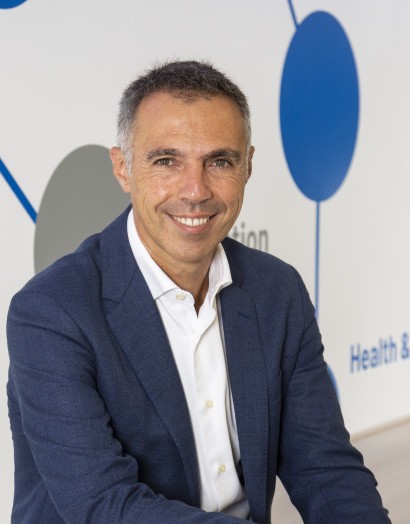Applications of biotechnology: how they are transforming our present and future
Biotechnology is present in many more aspects of our lives than we imagine: from the food we consume and the medicines we use, to the solutions that help preserve our planet's health. In this article, we explore how advances in life sciences are driving a global transformation in health, sustainability, and wellbeing, and what role Bioiberica plays in this future that is already present.
"We are firmly committed to sustainability and the circular economy. This involves the responsibility to constantly work to improve the health of people, animals, and plants, promoting a coherent ecological transition that contributes to creating a healthier planet."
What are life sciences and why are they essential?
Life sciences encompass disciplines such as biology, biochemistry, genetics, and biotechnology, whose common objective is to understand and improve living systems. Their impact on today's society is unquestionable: the WHO estimates that more than 40% of new medicines in development are based on biotechnology, and the FAO points out that agricultural bioinnovation is key to feeding a population that will reach 9.7 billion by 2050.
In the words of Luis Solera, CEO of Bioiberica: "We are firmly committed to sustainability and the circular economy. This entails the responsibility to work constantly to improve the health of people, animals, and plants, promoting a coherent ecological transition that contributes to creating a healthier planet."
What is biotechnology and how is it evolving?
We often speak of biotechnology as something distant, but it's present in our daily lives in functional foods, ingredients like bioactive peptides or probiotics that help improve digestive health, strengthen the immune system, or promote joint mobility. Also in medicines like heparin, one of the most widely used anticoagulants in the world that saves more than 100 million lives per year, according to the International Society on Thrombosis and Haemostasis. Additionally, it's in natural-origin ingredients, from native type II collagen that helps maintain joint health to biostimulants that reinforce crop growth under climatic stress conditions.
The result is clear: a better quality of life for people, animals, and plants. This comprehensive approach, One Health, is a paradigm that recognizes that human, animal, and plant health are deeply interconnected.
According to the Spanish Biocompanies Association (AseBio), the bioeconomy already represents more than 10% of national GDP and places the country among European leaders in projects linked to biotechnology applied to health, food, and the environment.

A more sustainable future thanks to biotechnology
Biotechnology not only transforms health, it also drives a more planet-friendly development model. Its applications range from agriculture and livestock to energy and waste management, helping to build a future where sustainability and progress go hand in hand.
In Spain, for example, the biotechnology sector has consolidated as one of the most relevant innovation engines, with Barcelona standing out as a strategic hub. According to AseBio, the bioeconomy already represents more than 10% of national GDP and places the country among European leaders in projects linked to biotechnology applied to health, food, and the environment.
Globally, the European Commission estimates that the bioeconomy generates more than €2.4 trillion and employs 17 million people in the EU, while the UN recognizes its potential to accelerate the achievement of the Sustainable Development Goals (SDGs). Among its most notable contributions are:
- Reducing waste and revaluing resources through the circular economy and industrial biotechnology
- Conserving water, soil, and energy through more efficient production techniques
- Contributing to climate action with solutions that help mitigate the effects of climate change and promote more resilient systems
In short, biotechnology has become a strategic pillar for addressing major global challenges: feeding a growing population, guaranteeing access to innovative medicines, preserving biodiversity, and advancing toward a more sustainable future.
At Bioiberica we continue driving solutions, convinced that only with science, innovation, and responsibility will we build a healthier, more sustainable, and resilient future.

Our role in this transformation
With more than 50 years of experience and presence in over 80 countries, we have consolidated ourselves as a reference in life sciences thanks to our three major areas of specialization:
- Human Health: We are world leaders in heparin production, an essential molecule for preventing thrombosis, and we also develop innovative nutraceutical ingredients such as Collavant® n2 (native type II collagen) or Mobilee® (hyaluronic acid for joint mobility), backed by scientific evidence.
- Animal Health: We produce functional ingredients to improve intestinal health and the immune system of production animals and offer specific solutions for joint and dermatological care of dogs and cats.
- Plant Health: Thanks to our natural biostimulants, we help crops overcome abiotic stress (droughts, salinity, extreme temperatures), while optimizing nutrient use and reducing environmental impact.
All of this under the One Health commitment and a production model based on sustainability, traceability, and circular economy.
Life sciences are redefining what we understand by health, expanding to all its dimensions: human, animal, and plant. Biotechnology offers us tools to cure, prevent, regenerate, and care for what surrounds us.
At Bioiberica we are clear: we are all one. That's why we will continue driving solutions, convinced that only with science, innovation, and responsibility will we build a healthier, more sustainable, and resilient future.
Bibliography
World Health Organization (WHO). (2023). Heparin: list of essential medicines and clinical uses. Available at who.int
Bioiberica. (2021, August 2). Bioiberica, first Spanish biotechnology company to align its CSR with the UN Sustainable Development Goals. Statements by Luis Solera, CEO. Available at: https://www.bioiberica.com/en/media/news/bioiberica/bioiberica-first-spanish-biotech-company-allines-its-csr-un-sustainable-development-goals
International Society on Thrombosis and Haemostasis (ISTH). (2021). Global impact of thrombosis: One in four deaths worldwide. Journal of Thrombosis and Haemostasis.
FAO – Food and Agriculture Organization of the United Nations. (2022). Agricultural biotechnology and biostimulants for a sustainable future. Available at fao.org
European Food Safety Authority (EFSA). (2021). The role of functional foods in human health. EFSA Journal.
OECD – Organisation for Economic Co-operation and Development. (2020). Biotechnology for sustainable agriculture and food security. OECD Publishing.
National Institutes of Health (NIH). (2022). Biotechnology in Medicine: Emerging applications. Disponible en: https://www.nih.gov
Nature Biotechnology Journal. Various articles on innovation in life sciences, animal and plant health.
Brief on jobs and growth in the EU bioeconomy 2012-2021 — JRC / European Commission: https://publications.jrc.ec.europa.eu/repository/handle/JRC137187?utm_source=chatgpt.com



